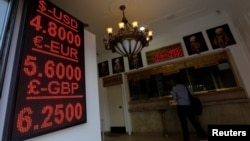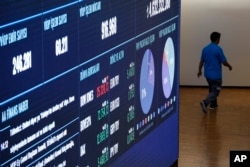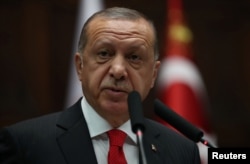The Turkish lira recovered some losses Thursday hours after it hit record lows. New Treasury and Finance Minister Berat Albayrak, President Recep Tayyip Erdogan's son-in-law, sought to reassure nervous markets that the central bank's independence was not in question.
The wild currency gyrations following Albayrak's appointment underscore concerns over what economic policy Erdogan will adhere to now that he has consolidated power following his June re-election.
The lira approached five to the dollar late Wednesday in a nearly 30 percent depreciation since the beginning of the year.
The heavy decline is a result of worries over Erdogan's economic expansion policy.
Although growth has soared more than 7 percent, inflation has surpassed 15 percent — a 15-year high — while the current deficit has widened to more than 6 percent of national income.
Analysts say after the June election, key ministers led investors to believe Erdogan would adopt austerity measures to rein in inflation. They are concerned the president, with the appointment of his son-in-law, may be seeking more control over monetary issues while excluding two prominent government figures from any say on policy.
"The two faces of market-friendly policies, Deputy Prime Minister Mehmet Simsek and Finance Minister Naci Agbal, are being excluded from policymaking roles," economist Inan Demir of Nomura International Securities said.
"Before the elections," he continued, "Agbal and Simsek had been talking to investors before the election, promising a return to orthodoxy that would generate a cooldown in the economy. The appointment of his son-in-law [Berat Albayrak] as the economy czar, would lead many investors to believe Erdogan will take tighter control of the economy, which would essentially annul promises of Agbal and Simsek."
Agbal and Simsek are credited with persuading Erdogan to agree to an emergency hike in interest rates in May to protect the lira after steep falls. The Turkish president subscribes to the unorthodox view that low interest rates curb inflation, describing high interest rates as "the mother and father of all evils."
Erdogan unnerved markets Tuesday by declaring his belief that "we will see interest rates fall in the period ahead." Investors say any interest rate reduction would result in the total collapse of the currency, and that further increases are needed to secure the lira.
In a move to calm investors, Albayrak Thursday pledged to cut inflation, saying structural reform and fiscal discipline would be enforced, and he guaranteed the central bank's independence. His statement saw the lira bounce back slightly.
Words, though, might not be enough. "It depends on how Albayrak will act really," economist Demir said. "It's possible if he manages to reassure the markets by actions, then the sell-off can subside. Otherwise, we will see an ongoing fall in lira assets going forward."
Analysts warn there is skepticism about whether Albayrak will follow through on his commitment to fiscal discipline. Erdogan's re-election campaign centered on the promise to continue with massive public construction projects and opposition to interest rate increases.
Political considerations
Political analyst Atilla Yesilada of Global Source partners suggests that political considerations could outweigh economic concerns.
"Something needs to be done. And the traditional recipe is belt-tightening and structural reforms in the traditional sense, to curtail domestic demand," he said. "The challenge there is not that Erdogan is incapable of signing off for such a recipe. He is facing local elections in March 2019, which are extremely important, and the voters need to be fed, and that is the opposite of what the traditional recipe requires."
A critical test of the direction Erdogan might choose will come at a July 24 meeting of the central bank. "If the central bank cannot find an opportunity to hike, the markets will take it very badly," Demir said.
The failure of the central bank to act likely would increase worries about the introduction of capital controls to restrict money from leaving Turkey in a bid to protect the lira.
Demir said such a move would be counterproductive as it would end much of the international investment. Turkey needs to borrow about $5 billion monthly to cover the difference between its imports and exports.
As speculation rises over the threat of capital controls, Demir acknowledged investors now are asking about the risk of such a move. Pressure for decisive action by the central bank at its meeting July 24 is seen as critical to stemming the risk of an investor stampede out of the Turkish market.






